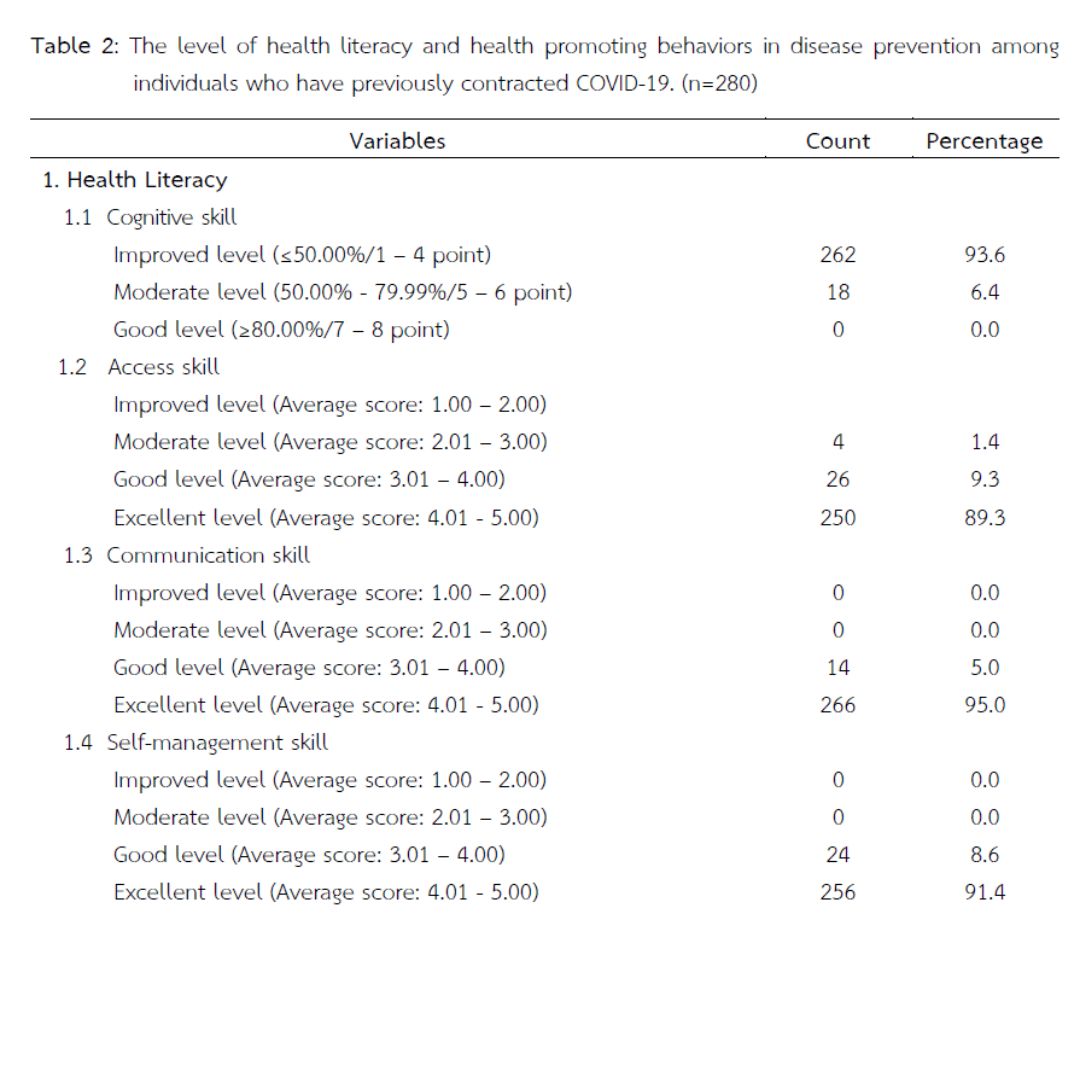THE RELATIONSHIP BETWEEN HEALTH LITERACY AND HEALTH PROMOTING DISEASE PREVENTING BEHAVIORS, AMONG PEOPLE WHO HAVE PREVIOUSLY BEEN INFECTED WITH COVID-19, IN THEPHARAK DISTRICT, NAKHON RATCHASIMA PROVINCE
Keywords:
Health literacy, Health promoting, Disease preventive COVID-19, COVID-19 patientsAbstract
This cross-sectional descriptive study aims to examine the relationship between health literacy and health promoting and disease preventive behaviors among people who have previously contracted COVID-19. The research sample consisted of 280 people selected through simple random sampling. The research tools included a self-developed health literacy questionnaire and a health promoting and disease preventive behaviors questionnaire, validated by three experts, with item-objective congruence (IOC) values ranging from 0.66 to 1.00 and reliability coefficients ranging from 0.77 to 0.97. Data were analyzed using statistics including frequency, percentage, mean, standard deviation, chi-square tests, and Pearson correlation coefficients. The findings were as follows: 1) Occupation, income, quarantine duration, and vaccination status were significantly related to health promoting and disease preventive behaviors regarding COVID-19 at a 0.05 significance level. 2) Health literacy in terms of access skill, communication skill, self-management skill, and media literacy skill was positively correlated with health promoting and disease preventive behaviors at .05 significance level. And 3) Health literacy in terms of cognitive skill was negatively correlated with health-promoting and disease-preventive behaviors at .05 significance level.
References
Benjamaporn A. & Warinee A. (2022). The relationship between health literacy and preventive behaviors for COVID-19 in the new normal era of working-age people in Bangkok and its vicinity. Journal of Nursing, 71(3): 27-35.
Bloom, B.S. (1956). Taxonomy of Educational Objectives, Handbook I: The Cognitive Domain. New York: Mckay.
Department of Disease Control, Ministry of Public Health. Weekly situation of COVID-19 patients in the country. [Internet]. (Date of access: 30 June 2022). Available from: https://ddc.moph.go.th/covid19-dashboard/?dashboard=main
Department of Disease Control. (2022 June 26). Coronavirus disease 2019 (COVID-19). advice for people self defense. https://ddc.moph.go.th/viralpneumonia/file/int_protection/int_protection_220665.pdf
Jandee K. & Thanapop C. (2022). Food Delivery Drivers’Health Literacy Regarding COVID-19 Prevention and Protective Behaviors During the COVID-19Pandemic: Cross-sectional Survey in Southern Thailand. JMIR Human Factors, 9(4), e37693. https://humanfactors.jmir.org/2022/4/e37693.
Jantima H & Panwadee K. (2021, February 19). Cognition and Protection Behaviors from Covid19 Epidemic Disease of People in Phuket. [Paper presentation]. The 11th National Academic Conference Community-led Social Innovation in the Era of Global Changes amidst Covid-19 Crisis, Southern College of Technology, Nakhon Si Thammarat, Thailand.
Kannika U. et al. (2022). Health literacy and preventive behavior for COVID-19 among the elderly at risk of dementia in rural communities, Chiang Rai Province. Chiang Mai University Nursing Journal, 49(1), 200 – 212.
Krejcie R.V. & Morgan D.W. (1970). Determining Sample Size for Research Activities. Educational and Psychological Measurement, 30(3), 607-610.
Nakhon Ratchasima Provincial Public Health Office. (2022). Nakhon Ratchasima Province COVID-19 Information Center. Nakhon Ratchasima Provincial Public Health Office.
Narunet L. & Suphot K. (2022). Factors related to behavior towards prevention of coronavirus disease 2019 among village health volunteers in Chum Phae District, Khon Kaen Province. Community Health Academic Journal, 8 (3), 8-24.
Nutbeam D. (2008). The evolving concept of health literacy. Social Science & Medicine, 67(12), 2072-8.
Onsribut W. & Junnual N. (2023). Health literacy and factors associated with quality of life of village health volunteers in situation of COVID-19 Mueang Ubon Ratchathani district, Ubon Ratchathani province. Journal of Medical and Public Health Region 4, 14(1), 109-121.
Piyanan et al. (2022). Factors Associated with Preventive Behaviors Against COVID-19 SAR-COV-2 among the Adult Population: a Case Study of Chom Thong District, Bangkok Metropolitan. Journal of Health Science, 31(2), 247-259.
Ratchanan S. et al. (2021). The relationship between health literacy and behavior in preventing COVID-19 disease among the elderly. Khon Kaen University Journal of Public Health Research, 14(3), 104-114.
Panyasaisophon, T. (2021). Research methodology for health promotion management. Nakhon Ratchasima College: Lertsilp Sasan Holding Co., Ltd.
Theparak District Public Health Office. (2022). Theparak District COVID-19 Information Center. Theparak District Public Health Office, Nakhon Ratchasima Province.
World Health Organization. (2022, June 30). Coronavirus (COVID-19) Dashboard 2021. Research Institute. https://covid19.who.int/

Downloads
Published
How to Cite
Issue
Section
License
Copyright (c) 2024 Primary Health Care Journal (Northeastern Edition)

This work is licensed under a Creative Commons Attribution-NonCommercial-NoDerivatives 4.0 International License.



